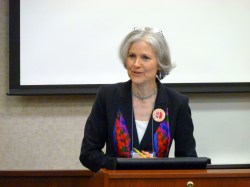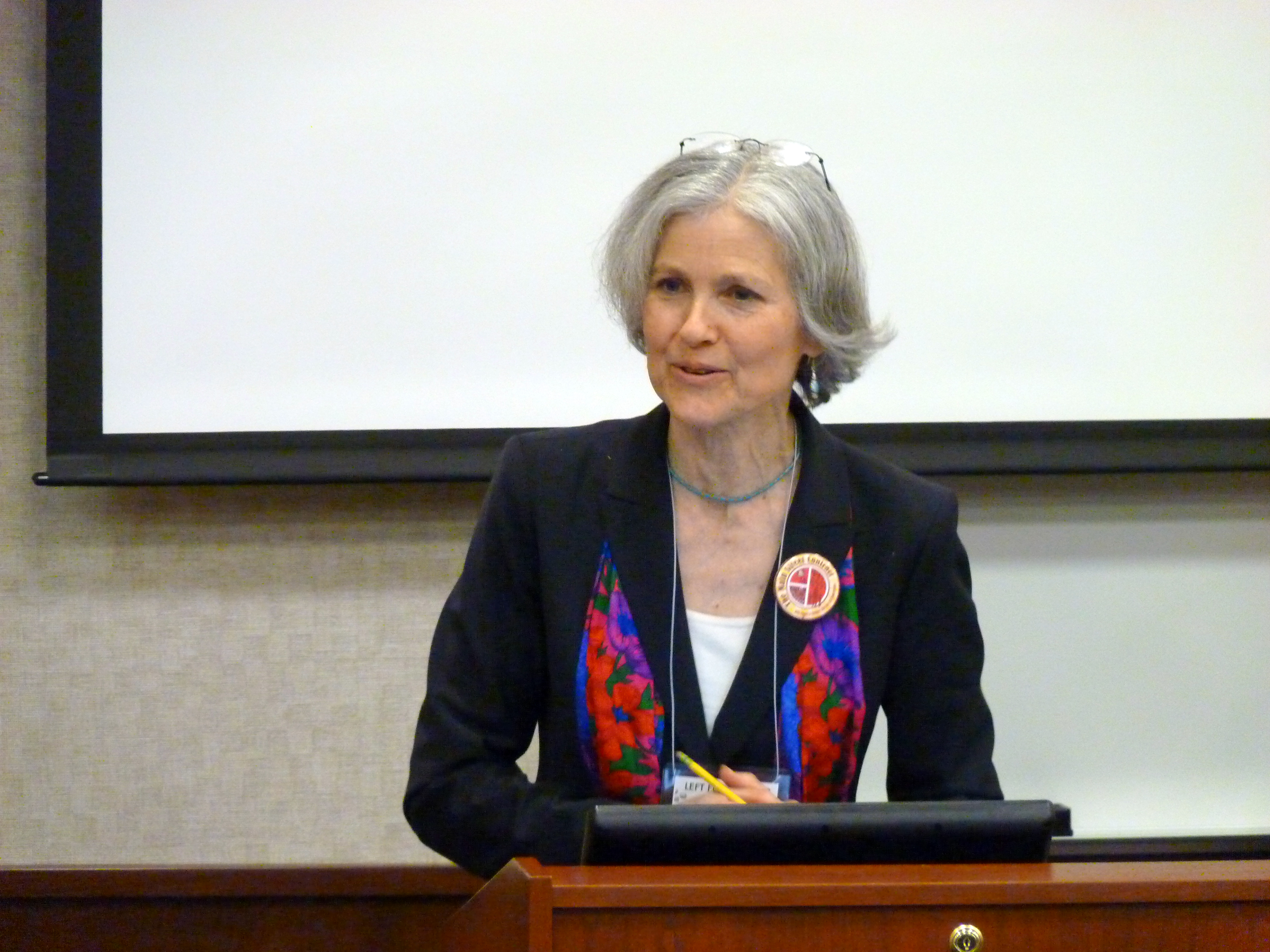 The Green Party gathered in Baltimore last weekend to choose a candidate who will go up against Barack Obama and (barring some strange GOP catastrophe) Mitt Romney in this fall’s presidential race.
The Green Party gathered in Baltimore last weekend to choose a candidate who will go up against Barack Obama and (barring some strange GOP catastrophe) Mitt Romney in this fall’s presidential race.
No surprises here: Boston physician Jill Stein bested second runner (and former sitcom star) Roseanne Barr by a 41 percent margin, winning 193.5 of a total 294 delegates. (One delegate was apparently split between Stein and a third candidate.) Stein, who ran against Romney in the 2002 Massachusetts gubernatorial election and won 3 percent of the vote, is running on a platform centered on her Green New Deal, an ambitious plan that would guarantee full employment of all Americans at a living wage, develop a green economy based on renewable energy sources, tax banker bonuses at a 90-percent rate, and legalize marijuana.
In her acceptance speech Saturday afternoon, Stein railed against a two-party system that she says offers little in the way of alternatives. The U.S. is “at the breaking point, for our people, for our economy, for our democracy, and for our planet,” she said.
Stein’s vice-presidential running mate will be Cheri Honkala, who ran for sheriff in Philadelphia in 2011. In her acceptance speech, Honkala talked about being a homeless, single mom in Minnesota. After she lost her apartment, she and her son lived in her car, then, when a drunk driver totaled that car, sought refuge in an abandoned house during winter. The Green Party, with its promises of jobs and health care for all, was a natural fit for her and her values.
“We are the new and unsettling force that Martin Luther King spoke for,” Honkala said.
Stein and Honkala addressed a crowd of a few hundred delegates crowded into the Chesapeake Room of the Holiday Inn on Baltimore’s Lombard Street. Representatives from all 50 states were there, including one delegate from Hawaii with a Chester A. Arthur-like beard who insisted the state was a sovereign nation. A majority of the crowd appeared to be middle-aged, although there were also college-age activists, like University of Wisconsin-Madison occupier Leland Pan.
The group slow-clapped to quiet the room, while delegates signaled their collective approval with the phalange-waving charm of spirit fingers. One speaker addressed them not as “fellow Americans,” but as “brothers and sisters.”
This, after a Friday night Green Party bash at an art and music venue in Baltimore’s Station North arts and entertainment district. Some 75 convention-goers enjoyed the musical stylings of eco-conscious band Woven Green, whose lead singer, Ashley Cash, sported frilly boots and an Earth-child headband. It was like an urban All Good Festival with booze, T-shirts for auction, and an arm-waving elderly man with a white ponytail who, given enough liquid lubricant, could have bested Beyonce in a “Single Ladies” dance-off.
But this was no Arab Spring. Even the Occupy movement was scarcely visible, save for a delegate from Delaware who demanded a mic check to quiet the room on Saturday, then led everyone in a “banks got bailed out, we got sold out” chant.
For a fledgling party, this year represents a small step forward. The Greens qualified for federal matching funds for the first time, but while party leaders can rile up a crowd of like-minded insiders, they seem woefully naïve when it comes to the politicking needed to build a national coalition and convince others outside the base to join in.
“The biggest challenge for any Green Party in any country is messaging,” said Richard Leckinger, a member of the Green Party leadership in New Zealand, where the Greens own 14 of 120 total seats in Parliament, making them third in terms of party representation. (Leckinger decided to attend the convention after realizing it coincided with a visit to his mother for her 80th birthday.) “You have to learn to talk to voters. I’m not sure the U.S. Greens are there yet,” he told me.
Of course, the Kiwis’ mixed-member, proportional electoral system, where people vote for both a party and a member of parliament, guarantees political parties seats in parliament even if they don’t win any electorate seats, but do win at least 5 percent of the party vote. (Still confused? Watch this video.)
Contrast that to our nation’s winner-take-all system, where a candidate with just 50.1 percent of the popular vote snags all a state’s electoral college votes, and the Green Party — which isn’t even currently tracked on Gallup’s 2012 election page — has a lot of work to do if it expects to have any impact on national politics.
Stein’s name is on the ballot in just 21 states right now, and her campaign lacks the money to purchase television advertisements. (The Green Party has no uber-rich super PACs.) She told the Boston Globe she’ll run a “traditional campaign,” traveling from state to state, and is counting on social media to spread the word about her candidacy.
Still, none of this seemed to matter Saturday. When Stein walked down the center aisle, assumed her place behind the lectern, and thundered in spite of her delicate frame, “This is the year we take our country back,” a Boeing 747’s worth of people rose to their feet in a standing ovation.
Now, if only some network other than C-SPAN had had its cameras rolling.


